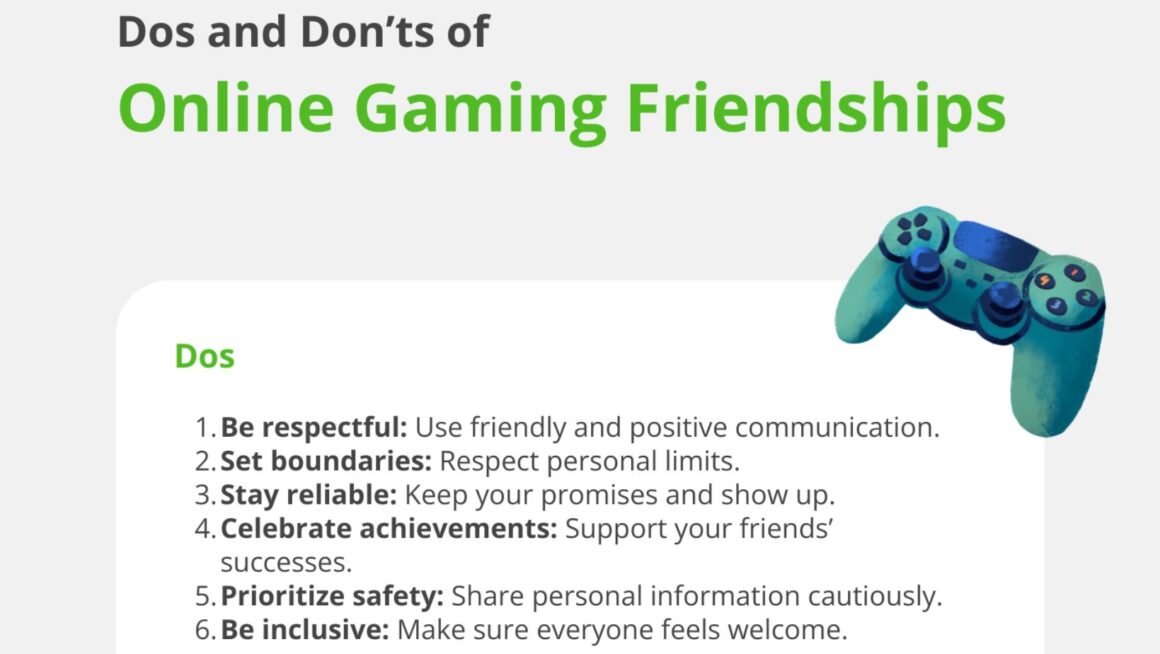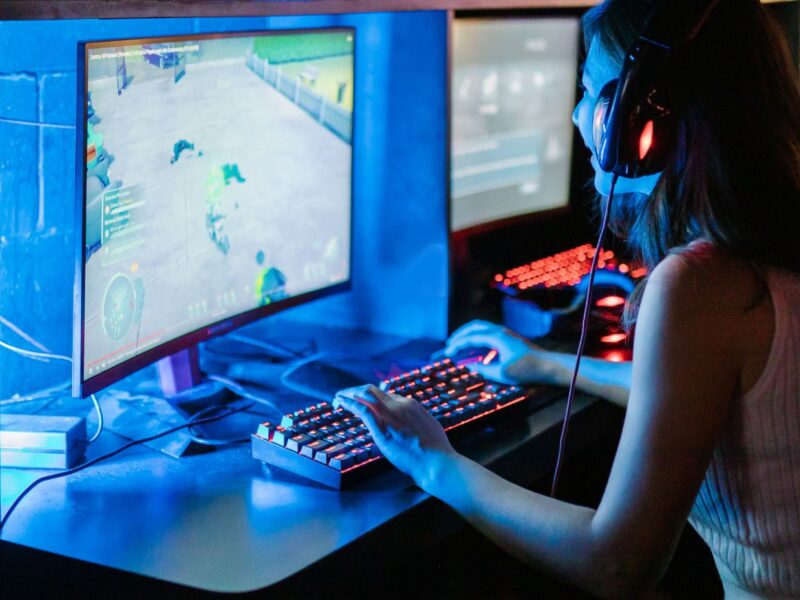Table of Contents
Online gaming has transformed from a solo pastime into a powerful platform for social connection, where players from all over the world come together in virtual spaces. More than just a game, these digital environments foster genuine friendships, built through teamwork, shared goals, and hours of interaction. Whether it’s through multiplayer battles, cooperative challenges, or simply exploring expansive game worlds together, online gaming creates natural opportunities for people to interact, make friends, and form bonds.
This article explores how these virtual friendships develop, the unique psychology behind them, and the ways they impact our real-world relationships.
Human beings have always used play as a way to connect. Whether it’s through childhood games or organized sports, play is a fundamental way for people to bond, cooperate, and form relationships. It creates a sense of shared experience, builds trust, and encourages teamwork—qualities essential for forming lasting connections.
In the digital age, online games have taken on this role, providing virtual playgrounds where people can come together, interact, and form friendships. Despite the physical distance, digital play can create similar bonds to those formed in real-life interactions, bringing people closer even when they’re miles apart. Whether it is shared goals and challenges or simply chatting with strangers online – despite being separated by distance, the act of playing together digitally mirrors the same social benefits as in-person play, fostering teamwork, cooperation, and camaraderie.
How Gaming Builds Real Friendships
Online gaming has become a powerful avenue for creating meaningful friendships. In these virtual spaces, players don’t just play games—they connect with others, building bonds that often last beyond the screen. While gaming friendships differ in setting from traditional relationships, they are rooted in the same essential elements: shared experiences, trust, and communication. Here’s how gaming nurtures real connections that feel as authentic as friendships formed in person.
- Collaborative Challenges Create Trust
Most online games are designed around group tasks that require teamwork, strategy, and cooperation. Working together toward shared goals fosters trust, as players come to rely on each other’s skills and knowledge. This sense of partnership builds a foundation for friendship, as teammates become allies both in and outside the game.
- Freedom to Express Authentic Selves
The anonymous nature of online gaming allows players to interact without the pressures of real-life appearances or social expectations. Through avatars, players feel more comfortable sharing parts of their personality that might stay hidden offline. This openness encourages genuine interactions, helping people find unexpected commonalities and shared interests.
- Regular Interaction Fosters Familiarity
Online games often bring players together in recurring sessions, whether through guilds, squads, or friend groups. Over time, this consistency builds familiarity, as players repeatedly connect with the same people. Regular interaction allows friendships to grow naturally, much like relationships that develop through frequent face-to-face gatherings.
- In-Game Communication Tools Deepen Connections
Online games offer a variety of communication tools, from text and voice chat to video. These features enable players to connect in real-time, discussing more than just the game. Personal conversations, jokes, and shared experiences create a sense of companionship, allowing players to see each other as real friends rather than just avatars on a screen.
By blending play with social interaction, online games provide an environment where friendships can thrive. These digital connections may start in virtual worlds, but the trust, understanding, and camaraderie they foster are very real. Through shared challenges, authentic interactions, and regular engagement, online gaming enables players to form bonds that are as meaningful as any offline friendship.
The Psychological Appeal of Forming Friendships in Virtual Worlds
Virtual friendships offer a distinct psychological appeal that meets social needs in a way few other environments can. Many people are drawn to online games because they provide a break from everyday pressures, and connecting with others in this relaxed setting allows friendships to develop organically. Free from social expectations, players often feel they can express parts of themselves that don’t always emerge in face-to-face interactions. This freedom helps them form connections that feel genuine and unfiltered, leading to friendships that are emotionally fulfilling.

A major psychological benefit of virtual friendships is the mental and emotional escape they offer. Gaming allows people to bond over exciting, often unpredictable experiences, offering a sense of adventure and novelty that fuels engagement. These unique experiences, shared with others, create strong emotional memories, contributing to the sense of closeness players feel toward one another.
Finally, virtual friendships provide a safe, non-judgmental space where people can interact without concern for geographical or cultural boundaries. Connecting with others who might have different perspectives adds diversity to these relationships, enriching players’ lives in a way that feels fresh and rewarding. In this inclusive, open environment, players find support and companionship that can be as impactful as real-world friendships, fulfilling deep social and emotional needs.
The Challenges of Online Friendships
While online friendships formed through gaming can be deeply meaningful, they also face unique challenges that can strain or even break these connections. Here are some of the main difficulties that players encounter when trying to maintain online friendships:
- Coordinating Time Zones and Schedules
Online friends often live in different time zones, making it difficult to find shared times for gaming sessions. Even if they schedule regular meetups, balancing gaming with work, school, and personal commitments can be demanding. Any disruption in this routine—whether due to new commitments or shifting schedules—can make the friendship feel distant or disconnected.
- Navigating Toxic Behavior in Gaming Communities
While many gaming communities are supportive, online spaces can also harbor toxic behavior, including harassment, trolling, and offensive language. In competitive games especially, aggression and negativity can be common, sometimes spilling over into friendships. Players may feel pressure to support each other in these environments, but this can be challenging when friends encounter hostility from other players. Toxic behavior can strain the gaming experience, potentially impacting the quality of the friendship.
- Dealing with Miscommunication
Without the help of face-to-face cues, online interactions are prone to misinterpretation. Jokes, sarcasm, or comments intended in a lighthearted way can be easily misunderstood, leading to unnecessary tension. The lack of immediate clarifications that happen naturally in person can cause small issues to escalate if not quickly addressed, sometimes resulting in avoidable conflicts.
- Managing Shifting Interests
Gaming preferences and interests often change over time. If one friend loses interest in a particular game or platform, maintaining the same level of interaction can become difficult. While some friendships adapt by moving to new games or communication channels, others may fade if one player moves on to different interests or hobbies. This shift can create feelings of distance, as the common ground that once defined the friendship begins to erode.
Despite these challenges, many online friendships find ways to thrive. By working to coordinate time effectively, addressing toxic behavior openly, communicating clearly to avoid misunderstandings, and adapting to changing interests, online friends can overcome these obstacles and sustain meaningful connections. Recognizing and addressing these hurdles helps create a healthier and more supportive environment where online friendships can truly flourish.
Conclusion
Online gaming has become a vibrant social space where players can build friendships that often feel as real and meaningful as offline connections. By encouraging teamwork, open self-expression, and regular interaction, virtual worlds enable players to form bonds that withstand the barriers of distance and anonymity.

However, maintaining these friendships can be challenging, as issues like time zone differences, miscommunication, and occasional toxicity in gaming communities can create obstacles. Yet, the resilience and adaptability of online friendships show the enduring power of shared experiences and mutual support, proving that digital spaces can foster genuine, lasting connections.







